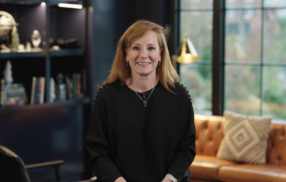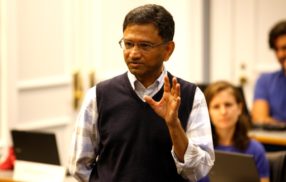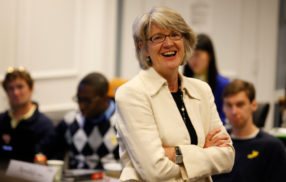
How Faculty Research Will Serve as the Foundation for UVA Darden’s Greatness
By Jay Hodgkins
Prospective students choose the University of Virginia Darden School of Business for its top-ranked faculty and education experience.
Alumni affirm with their voices and philanthropic support that those touchstones are what they care most about, too. The School’s leadership works tirelessly to protect these two superlatives, Darden’s greatest competitive advantages.
There’s little debate: Faculty excellence and student experience are paramount at Darden.
But what often goes unseen are the important details that make top rankings for faculty and education experience possible; details like a world-class research support infrastructure and leading research centers and initiatives.
This is a story about those details and why they matter. This is a story about how support for faculty research and thought leadership is the means to preserve what the Darden community cherishes.
“The world has come to expect great teaching and learning experiences from Darden. They see it as our unique contribution and primary value to the world,” said S. “Venkat” Venkataraman, Mastercard Professor of Business Administration and Senior Associate Dean for Faculty and Research. “Many of Darden’s beloved professors impacted you because they stayed connected to the cutting edge of both theory and practice. The task now is to enable the future of our young scholars to scale the heights of a storied past and even exceed them.”
How New Professors Become Great Professors
Thanks to the generous support of Darden’s donors, the School has been incredibly successful in recent years hiring new faculty talent and retaining top mid-career professors to offset a wave of faculty retirements. Since 2010, the School has hired more than 50 new professors as the faculty expanded to more than 90 members.
With so many new faces, there is a learning curve to go from high potential to high performance. Professors climb that learning curve by becoming thought leaders in compelling areas of research.
“It’s not just about great teaching. It’s about teaching great things,” Venkat said. “Our faculty consistently delivers the best educational experience by creating a classroom that considers leading-edge research and ideas from the world of practice. Teaching and research excellence are intertwined, and this powerful combination is a hallmark of Darden that we must not lose.”
Research gives faculty members a voice in the world of business and policy practice, which leads companies to partner with Darden professors. The faculty can then bring the benefits of new ideas and proximity to practice into the classroom in powerful ways for students.
That only works, however, if they have time and support to do it all.
“Conducting rigorous research takes time, effort and labor. However, faculty members juggle many responsibilities — from research to devoting time to students in and outside the classroom to engaging with practitioners and other academics to developing educational materials,” said Professor Tami Kim, who joined the Darden faculty in 2017 after earning her DBA at Harvard Business School. “Being at a world-class institution like Darden means we have a platform to make impact with our thought leadership. However, we cannot do so without having a solid research infrastructure that allows us to also dedicate our time to promote student-centered learning.”
The Vision for Faculty Research Support
The School is already expanding its research infrastructure available to the faculty. Campaign support has also helped launch exciting new research initiatives, such as the Venture Capital Initiative, Real Estate Initiative, Initiative for Transformational Leadership and Learning, and Business Innovation and Climate Change Initiative.
Senior Associate Dean Mike Lenox, the Tayloe Murphy Professor of Business Administration, announced in January that Darden had officially reorganized its research infrastructure into the Office of Research Services (ORS) and the Center of Excellence Support Services (CESS).
The changes will allow the School to most efficiently and effectively provide the support the faculty needs to conduct groundbreaking research and ensure it makes an impact in the class, in business and in society.
The ORS will provide research support including data gathering and analysis, conducting experiments and literature searches, and securing and managing research assistants, among other planned activities. The CESS will provide assistance to Darden’s three research Centers of Excellence: the Batten Institute, the Institute for Business in Society and the Richard A. Mayo Center for Asset Management. Lenox oversees the ORS and the CESS.
“We have been testing this structure over the last year in a soft launch,” Lenox said. “The closer coordination and communication across these areas will allow us to more effectively work with faculty members to generate and amplify our research.”
To provide direct support to the faculty’s excellence in research and the classroom, Darden seeks support for the two new offices, in addition to a planned Office of Teaching Excellence (OTE).
The OTE will include a center for case development and focus on bringing cutting-edge ideas into the classroom in the form of curricular innovations and teaching materials.
Kim shared how these kinds of resources help her produce impactful research.
“My work relies on a combination of online, lab and field studies. Conducting experiments can be costly in terms of both the labor required to conduct studies and compensation needed to recruit human subjects,” she said. “In one research project studying the effects of gender-labeled products, I needed to recruit female participants. Darden’s research staff helped me recruit over 200 participants in just a few hours by setting up a survey station on the Corner. Darden’s research budget, access to research center funds and express-lane funding have been critical to meet unforeseen needs for recruiting human subjects.”
Darden will continue to have special focus on areas of research where it is a recognized leader — business ethics, investment management, and entrepreneurship and innovation. This will ensure limited resources can make the greatest impact advancing business practice and the School’s reputation.
The School seeks to endow the Institute for Business in Society and a new Institute for Global Investment Management, which will allow them to join the Batten Institute as fully endowed institutes.
The School also seeks support for a new data analytics lab and initiatives that bolster specific subject areas that fall within its three areas of research focus.
“The time is now to invest in the teaching and the research infrastructure that take raw faculty talent and transform it into thought leaders and impactful teachers and mentors for talented students who will go on to become leaders in the world of tomorrow,” said Lenox.
The University of Virginia Darden School of Business prepares responsible global leaders through unparalleled transformational learning experiences. Darden’s graduate degree programs (MBA, MSBA and Ph.D.) and Executive Education & Lifelong Learning programs offered by the Darden School Foundation set the stage for a lifetime of career advancement and impact. Darden’s top-ranked faculty, renowned for teaching excellence, inspires and shapes modern business leadership worldwide through research, thought leadership and business publishing. Darden has Grounds in Charlottesville, Virginia, and the Washington, D.C., area and a global community that includes 18,000 alumni in 90 countries. Darden was established in 1955 at the University of Virginia, a top public university founded by Thomas Jefferson in 1819 in Charlottesville, Virginia.
Press Contact
Molly Mitchell
Senior Associate Director, Editorial and Media Relations
Darden School of Business
University of Virginia
MitchellM@darden.virginia.edu







